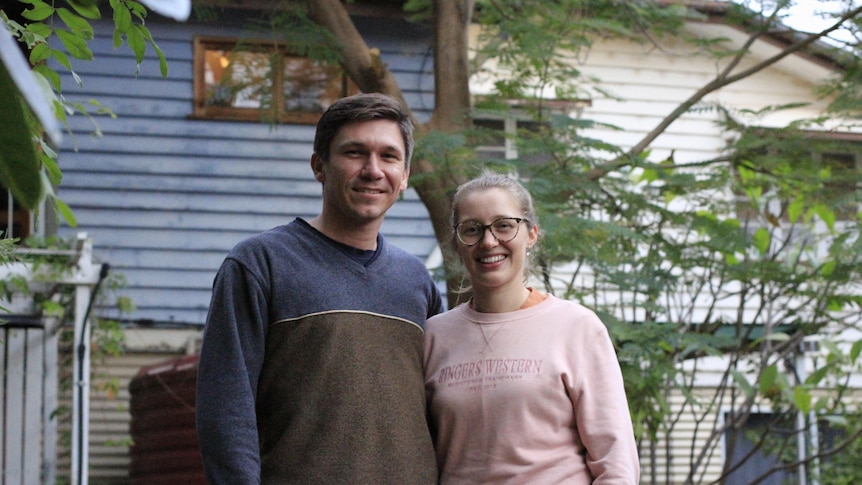A 25-year-old buying a two-storey house with a picturesque garden for just over $300,000 harks back to the early 1990s.
Key points:
- Parts of regional Queensland have seen property prices continue to rise in July, bucking national trends
- Regional Australia Institute says housing affordability will see large parts of regional Queensland more insulated from property price drops than cities
- The Gold Coast and Sunshine Coast markets are exceptions, recording accelerated declines in recent months
But in outback Queensland towns such as Longreach, it’s the norm.
The Reserve Bank of Australia yesterday raised interest rates for the fourth consecutive month, but Longreach resident Ben Galea said he was not stressed.
“When it comes time for my fixed interest rate to change … I don’t have to change my lifestyle,” Mr Galea said.
“It’s a great town. It’s buzzing. There are a lot of young people here. There are lots to do, lots of sports. It’s brilliant.
“There are things that we don’t have out here. It costs money to fly back to the coast. You don’t see family as often. These are the things you give up.”
As interest rates rise, home values in Australia are dropping at their fastest pace since the global financial crisis, with the latest data showing that the nation’s median property value has dropped by 2 per cent since the beginning of May, to $747,182.
But parts of regional Queensland are tipped to be more insulated from price drops than cities, and some regions have continued to see property prices increase in the last month.
Regional Australia Institute chief executive Liz Ritchie said it was mostly due to housing affordability in the regions.
“What we won’t see is the markets in regional Australia and regional Queensland fall as sharply,” she said.
“In the past couple of years, regions have seen significant price growth… but this is off years of just having steady incremental growth.
“The shocks that we’re seeing with interest rate hikes just won’t be felt in the same way, particularly in Queensland’s more rural and remote communities.”
Regional buyers ‘not overly worried’
Toowoomba-based Heritage Bank’s chief operating officer Dan Dredge said recent hikes to interest rates had not affected the number of people applying for home loans in regional Queensland through his bank.
“We’re not seeing people being overly worried about interest rate rises,” Mr Dredge said.
“What we’re seeing is people budgeting and setting their expectations on higher interest rates, moving forward.”
Data from CoreLogic found dwelling values in regional Queensland fell by 0.8 per cent in July, compared to larger falls of 2.2 per cent in Sydney and 1.5 per cent in Melbourne.
It was the first monthly decline for regional Queensland since August 2020 and follows record annual gains, with regional house prices increasing by 19 per cent over the past year.
But the data is not as simple as it seems.
CoreLogic head of research Eliza Owen said the decline in regional Queensland in July was a result of large price drops of more than 1 per cent in the Gold Coast and Sunshine Coast markets, where median house prices were higher than in Brisbane.
“The Gold Coast and Sunshine Coast have seen more accelerated declines in recent months due to interest having more of a dampening effect on these relatively expensive markets,” Ms Owen said.
“Smaller and more affordable markets of Queensland may have shown modest gains over the month of July, but even here, monthly growth rates have been broadly slowing since earlier in the year.”
House prices on rise in ‘affordable’ regions
Bucking the trend of capital cities, home values have continued to increase in July at a slowing rate across Wide Bay (up 0.6 per cent), Toowoomba (up 0.7 per cent), the Darling Downs – Maranoa (up 1.8 per cent), and Cairns (up 0.1 per cent).
“It is expected that these markets may also see a decline in values in the coming months against higher interest rate settings,” Ms Owen said.
But Mr Dredge said strong growth in regional areas would continue to drive demand for housing and home loans.
“You continue to see for hire or job signs in windows on the main street and Toowoomba. I don’t see that going away anytime soon,” he said.
“I think that’s going to lead to continued demand for new home purchases and home loans.
“Historically, as long as people have good jobs and good savings buffers, they’re able to service their home loans.”
The Regional Australia Institute also forecasts a continued movement of people from capital cities into regional areas.
Ms Ritchie urges there needs to be a government focus on increasing housing supply and infrastructure to ensure a smooth transition for regional Australia.
“We continue to believe that city to regional migration will continue to flow at similar, if not even higher levels,” she said.
“If you look at the way that our country has shifted due to COVID, the ability to move, flexibility … to live where you love and have that opportunity.
“You’ve got a trend that is not going to stop any time soon.”
.
